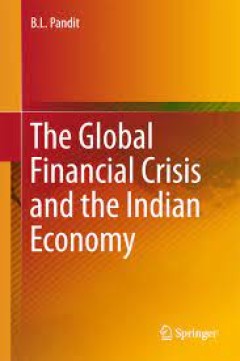Filter by

The Handbook of Post Crisis Financial Modelling
The 2008 financial crisis was a watershed moment which clearly influenced the public's perception of the role of 'finance' in society. Since 2008, a plethora of books and newspaper articles have been produced accusing the academic community of being unable to produce valid models which can accommodate those extreme events. This unique Handbook brings together leading practitioners and academ…
- Edition
- 1
- ISBN/ISSN
- 978-1-137-49449-8
- Collation
- XIX, 316
- Series Title
- The Handbook of Post Crisis Financial Modelling
- Call Number
- -

Business Cycles in the Run of History
This book analyzes the development of economic cycles in the run of history. The focus is on the development of cycle theory, with maximum emphasis upon ideas. Chapter 1 delivers an overview of the debate about cycles before the 1970s. Chapter 2 completes this survey by presenting the main empirical investigations since that time. Finally, Chapters 3 and 4 illustrate the discourse, by presentin…
- Edition
- -
- ISBN/ISSN
- 978-3-319-24325-2
- Collation
- -
- Series Title
- -
- Call Number
- -

Business Challenges in the Changing Economic Landscape - Vol. 1: Proceedings …
This book is the first of the two volumes featuring selected articles from the 14th Eurasia Business and Economics conference held in Barcelona, Spain, in October 2014. Peer-reviewed articles in this first volume present latest research breakthroughs in the areas of Accounting, Corporate Governance, Finance and Banking, Institutional and International Economics, and Regional Studies. The contri…
- Edition
- -
- ISBN/ISSN
- 978-3-319-22596-8
- Collation
- -
- Series Title
- -
- Call Number
- 332

Analyzing Financial Data and Implementing Financial Models Using R
This book is a comprehensive introduction to financial modeling that teaches advanced undergraduate and graduate students in finance and economics how to use R to analyze financial data and implement financial models. This text will show students how to obtain publicly available data, manipulate such data, implement the models, and generate typical output expected for a particular analysis. …
- Edition
- Ed. 1
- ISBN/ISSN
- 978-3-319-14075-9
- Collation
- XVI, 351
- Series Title
- Springer Texts in Business and Economics
- Call Number
- 332 ANG a

The Power of the Chinese Dragon
This important reader brings together published articles from Palgrave's journal The European Journal of Development Research on the development between China and Africa as well as emerging national economies in the BRICs group. Topics include trade relations, investment in sub-Saharan Africa, global politics of development and more.
- Edition
- -
- ISBN/ISSN
- 978-1-137-57449-7
- Collation
- XII, 275
- Series Title
- Palgrave Readers in Economics
- Call Number
- -

Analytics for Smart Energy Management: Tools and Applications for Sustainable…
This book introduces the issues and problems that arise when implementing smart energy management for sustainable manufacturing in the automotive manufacturing industry and the analytical tools and applications to deal with them. It uses a number of illustrative examples to explain energy management in automotive manufacturing, which involves most types of manufacturing technology and various l…
- Edition
- Ed. 1
- ISBN/ISSN
- 978-3-319-32729-7
- Collation
- XI, 295
- Series Title
- Springer Series in Advanced Manufacturing
- Call Number
- 658 OHS a

The Global Financial Crisis and the Indian Economy
After tracing the causes of the global financial crisis, the book focuses on two fundamental systemic issues connected with its manifestation: financial-sector regulation and the problem of the dollar-centric international monetary system, both of which have been widely cited among the important factors leading to the 2008 financial crisis. The important analytical question of monetary policy t…
- Edition
- 1
- ISBN/ISSN
- 978-81-322-2395-5
- Collation
- XI, 142, 31 b/w illustrations
- Series Title
- The Global Financial Crisis and the Indian Economy
- Call Number
- -

The Global Crisis of 2008 and Keynes's General Theory
This book describes the international context and some of the factors that have weakened the influence of Keynesian economic thought. It illustrates economic responses offered by the new Keynesian school and the alternative perspective on the global crisis presented by the monetary circuit theory, with a special emphasis on Minsky’s financial instability hypothesis. The authors present a comm…
- Edition
- 1
- ISBN/ISSN
- 978-3-319-11451-4
- Collation
- -
- Series Title
- XII, 99 17 b/w illustrations ,
- Call Number
- -

ICT Diffusion in Developing Countries: Towards a New Concept of Technological…
This book provides an extensive overview of the diffusion of Information and Communication Technologies (ICTs) in developing countries between 2000 and 2012. It covers issues such as country-specific ICT diffusion patterns, technological substitution and technological convergence. By identifying social, economic and institutional prerequisites and analyzing critical country-specific conditions,…
- Edition
- -
- ISBN/ISSN
- 978-3-319-18253-7
- Collation
- XI, 308
- Series Title
- -
- Call Number
- 330 ICT

Building the Impact Economy : Our Future, Yea or Nay
This book develops a comprehensive framework for creating sustainable new business approaches on a massive scale. It relates the power of entrepreneurship, investment and technology to four areas in which progress is urgently needed to get out of the world’s current impasse. These are: game-changing innovations in companies; a way forward for the global fashion industry that reconciles compet…
- Edition
- -
- ISBN/ISSN
- -
- Collation
- -
- Series Title
- -
- Call Number
- 330
 Computer Science, Information & General Works
Computer Science, Information & General Works  Philosophy & Psychology
Philosophy & Psychology  Religion
Religion  Social Sciences
Social Sciences  Language
Language  Pure Science
Pure Science  Applied Sciences
Applied Sciences  Art & Recreation
Art & Recreation  Literature
Literature  History & Geography
History & Geography